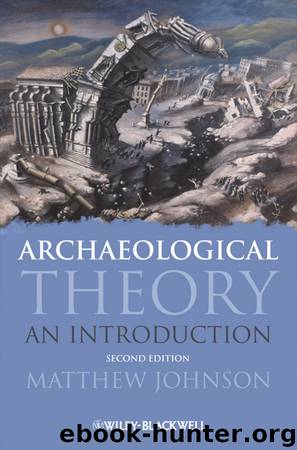Archaeological Theory by Johnson Matthew

Author:Johnson, Matthew.
Language: eng
Format: epub
Publisher: John Wiley & Sons, Inc.
Published: 2011-08-31T16:00:00+00:00
Cultural Evolution and Marxism
As we have seen with the constellation of Darwin, Marx and Spencer, there is a great deal of common ground between much of evolutionary thought and classical Marxism. Marxism can be seen as one form of cultural evolutionary theory, and conversely, much cultural evolutionary theory can be seen as a form of Marxist thought, though often the Marxist content is implicit or coded. Indeed, Leslie White was attacked in the McCarthyite paranoia of his time for his political beliefs, though conversely he was accused of watering down his Marxism by others such as Maurice Bloch. Several of the autobiographical accounts of New Archaeologists make it clear that cultural evolutionary ideas of the 1960s were discussed and advocated within a North American intellectual and cultural environment in which Marxism played a very significant role, even if this was not overtly acknowledged at the time.
Classical Marxism, as discussed in earlier chapters, proposes that all societies go through the same set of stages: primitive communist, ancient, feudal, capitalist. Marx and Engels, indeed, read and were profoundly influenced by the thought of several nineteenth-century evolutionary thinkers, most notably Maine and Morgan. Marx wanted to dedicate Das Kapital to Charles Darwin, though Darwin declined the honour.
Cultural evolution also shares many of the problems of classical Marxism. One of these is that in its ‘classical’, unilinear form, Marxism allows little or no room for contact between societies. If societies evolve from one state to another, what role is there for cultural contact and diffusion? Others have argued that to propose one single scheme of evolution is simplistic. Societies might develop along different paths.
One particular form of Marxism which engages with evolutionary questions is ‘Latin American social archaeology’. Latin American social archaeology had its origins in the 1970s and 1980s as an application of Marxist, and implicitly evolutionary, ideas to the archaeological record, particularly via Gordon Childe’s discussion of social evolution. Latin American social archaeologists make an analytical division between socio-economic formation, mode of life or modo de vida, and culture.
The first of these three categories, socio-economic formation, refers to the general historical stage of a society; the last, ‘culture’, refers to its particular properties. The intermediate category, modo de vida, refers to the range of different modes of existence that can occur within a general socio-economic formation. For example, within the general socio-economic formation of hunter-gatherer societies, one might have different forms of modo de vida according to different relative stresses on hunting and gathering, and still more different particular examples of different ‘cultures’, each with particular features. Latin American social archaeology, by dividing social analysis in this way, makes the claim that it can combine forms of unilinear and multilinear evolution within a single framework of analysis.
A second form of thinking relevant in this context is political economy. Political economy, as a general term, refers to the relations between political and economic practices and systems. It was developed as a body of thought by Karl Marx, who drew on earlier ‘classical economists’ such as David Ricardo and Adam Smith.
Download
This site does not store any files on its server. We only index and link to content provided by other sites. Please contact the content providers to delete copyright contents if any and email us, we'll remove relevant links or contents immediately.
| Anthropology | Archaeology |
| Philosophy | Politics & Government |
| Social Sciences | Sociology |
| Women's Studies |
Mysteries by Colin Wilson(3456)
People of the Earth: An Introduction to World Prehistory by Dr. Brian Fagan & Nadia Durrani(2738)
Ancient Worlds by Michael Scott(2688)
The Splendid and the Vile by Erik Larson(2474)
Foreign Devils on the Silk Road: The Search for the Lost Treasures of Central Asia by Peter Hopkirk(2464)
The Memory Code by Lynne Kelly(2403)
Come, Tell Me How You Live by Mallowan Agatha Christie(2260)
The Earth Chronicles Handbook by Zecharia Sitchin(2229)
Lost Technologies of Ancient Egypt by Christopher Dunn(2226)
The Plantagenets by Dan Jones(2090)
Last Chance to See by Douglas Adams(1991)
The Return of the Gods by Erich von Daniken(1946)
Wars of the Anunnaki by Chris H. Hardy(1715)
Keeper of Genesis by Graham Hancock(1649)
Before the Dawn by Nicholas Wade(1606)
The Cygnus Mystery by Andrew Collins(1559)
The Message of the Sphinx by Graham Hancock(1513)
Fragile Lives by Stephen Westaby(1455)
A History of the World in 100 Objects by MacGregor Neil(1370)
